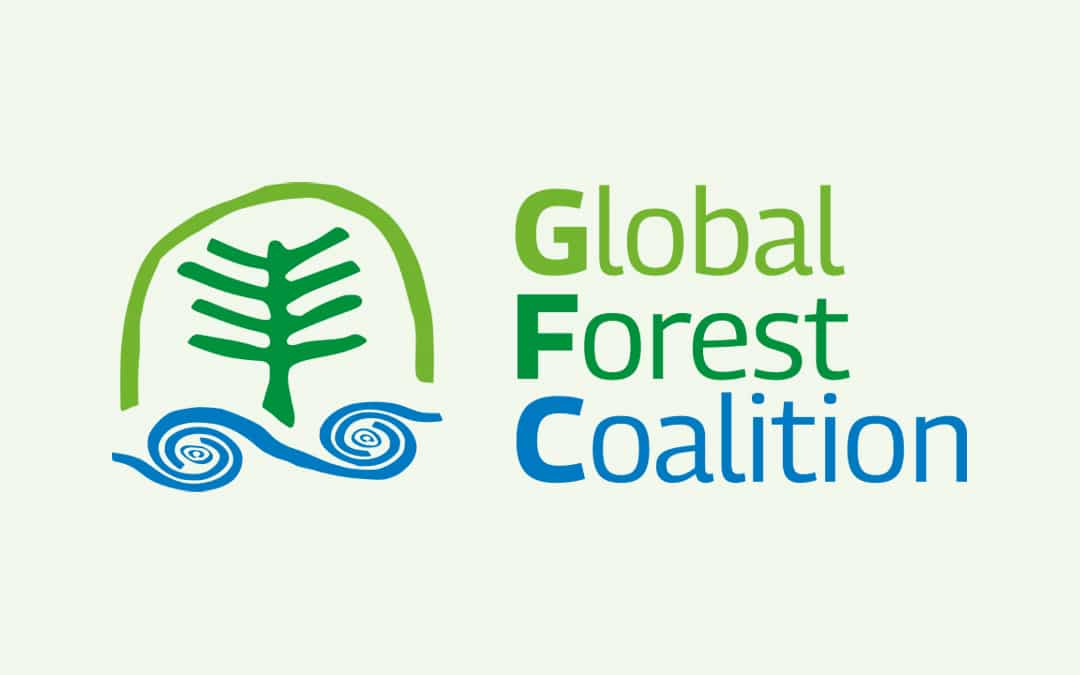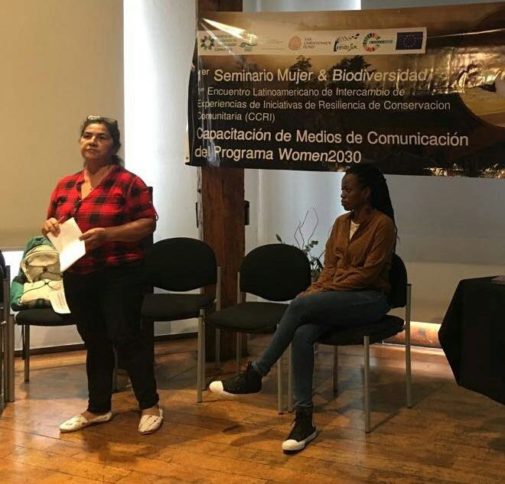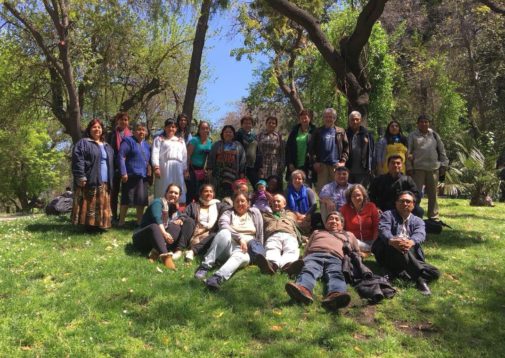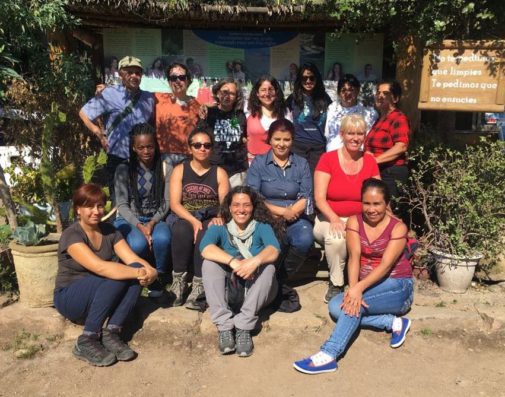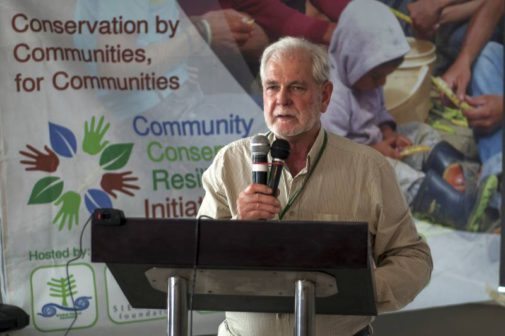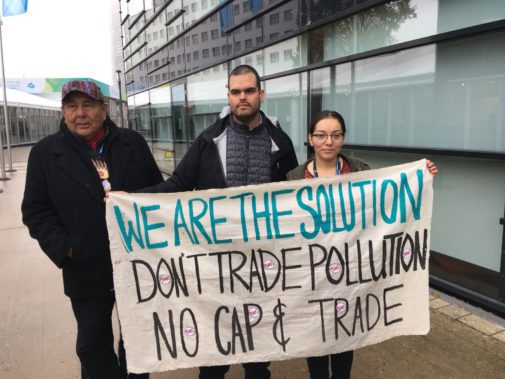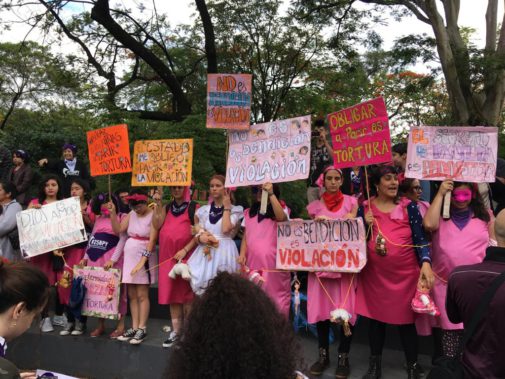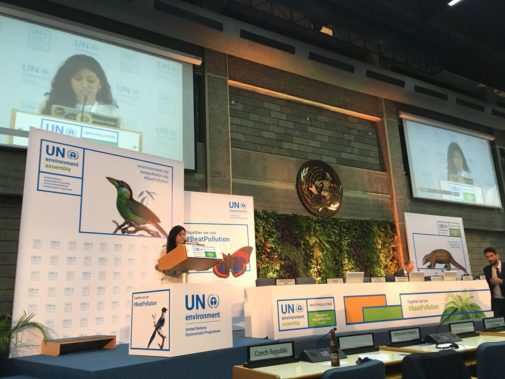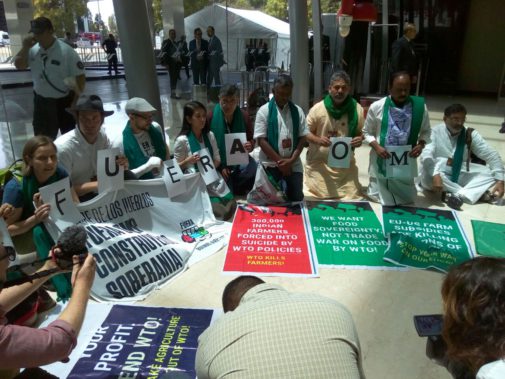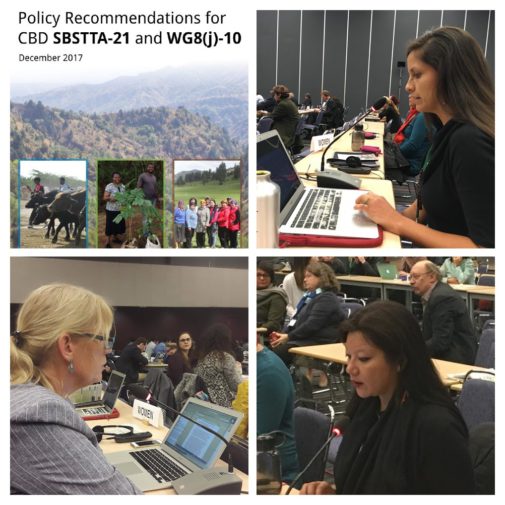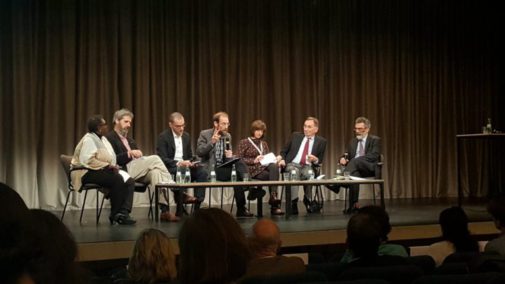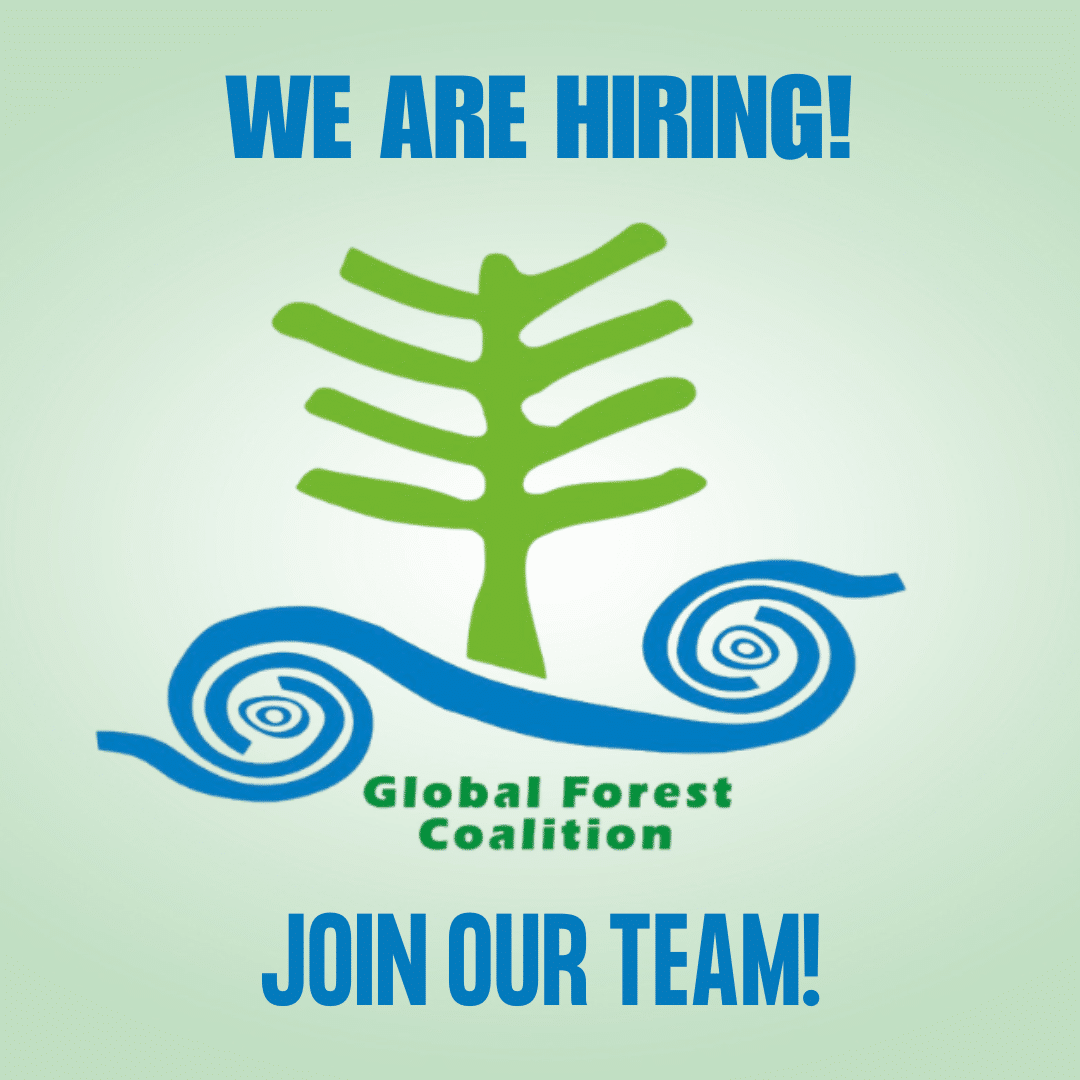Looking to the year ahead with solidarity, strength and determination
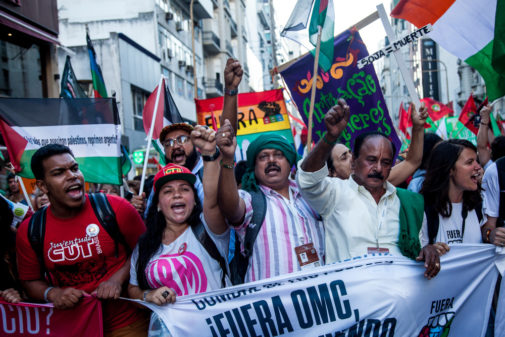
Photo: FueraOMC
By Mary Louise Malig
Best wishes for the New Year! As we forge ahead into 2018 we are looking forward to facing the new opportunities and challenges that lay ahead, together.
This Roots issue looks back at the last quarter of 2017. GFC participated in and mobilised around numerous international fora in our efforts to defend the rights of forests peoples, Indigenous Peoples and communities. We targeted policy and funding decisions in various climate funding mechanism meetings, such as the Green Climate Fund, we participated in key climate change negotiations, and we gave crucial submissions at the meetings of the UN Convention on Biological Diversity.
Together with member groups in Latin America, GFC also organised a series of events in Chile, which included a Community Conservation Resilience Skillshare and a Women2030 Media Training. These events generated much enthusiasm and galvanised a strong sense of solidarity between member groups across the region.
We also participated actively in collective efforts to stop the WTO from consolidating its power in new trade talks in Argentina, and against the EU-Mercosur deal with its potentially disastrous impacts on communities, forests, and biodiversity. The widely-celebrated collapse of the trade talks shows how strong collective action can be, and highlighted the need to continue to promote our alternative visions to these profit-driven, destructive trade deals. In the place of institutions such as the WTO and EU-Mercosur, we must focus on communities and their ways of conserving forests and biodiversity.
Finally, we bid farewell to our dear comrade, brother and friend, Wally Menne. A stalwart in the fight against monoculture tree plantations and for the rights of forests peoples, Wally fought relentlessly for environmental and social justice. We will miss Wally and his indomitable spirit, and will honour his memory through a renewed commitment to our struggles.
Update on the Green Climate Fund Board Meeting
Seminar: ‘Women & Biodiversity’
Latin American Community Conservation Resilience Initiative (CCRI) skillshare
Women2030 Media Training
We will sincerely miss you, Wally Menne
UNFCCC COP 23
Update on climate funding mechanisms
Calling out violence against women human rights and environmental defenders
UNEA-3
WTO OUT Week of Action and the 11th Ministerial of the World Trade Organization
Contributions of collective action, traditional knowledge and customary sustainable use to the Aichi Biodiversity Targets and Sustainable Development Goals
Climate Engineering Conference 2017, Berlin
Publications from October to December
Update on the Green Climate Fund Board Meeting
By Coraina de la Plaza
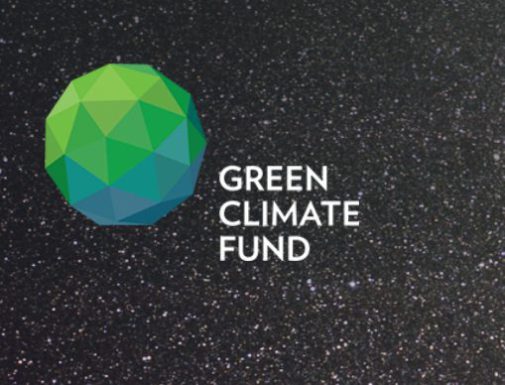
During the Board Meeting, CSOs criticised the fact that discussions on several long-overdue policies were once again not on the agenda, such as the Indigenous Peoples Policy, the Gender Equality and Social Inclusion Policy, and the Environmental and Social Management System (ESMS). These policies will apparently be discussed at the next meeting in February, and there was an open call for inputs last November. GFC contributed to the CSO joint submission on Gender Equality and Social Inclusion and ESMS, and also signed a submission coordinated by the Indigenous Peoples group on the Indigenous Peoples Policy.
Seminar: ‘Women & Biodiversity’
By Isis Alvarez
The 1st International Seminar on “Latin American Women in Biodiversity Conservation” was held at the University of Chile on 3 October 2017, and over 50 people participated in it. Panelists from all over Latin America included women from Chile, Colombia, Mexico, Brazil, Paraguay, Panama and Bolivia. They described their different experiences of the roles of women in biodiversity conservation in their communities. Many common points emerged, such as the struggle for access to land, and how traditional biodiversity management practices are now threatened by various mega-projects and harmful government policies that only serve corporate interests. There was a special tribute to the struggles of women environmental defenders such as Berta Caceres, Maxima Acuña and Silvia Gattica. There was also space to discuss ways of strengthening the visibility of women in biodiversity conservation, and opening up channels of communication for supporting and strengthening further work in the region.
Latin American Community Conservation Resilience Initiative (CCRI) skillshare
By Isis Alvarez
The Global Forest Coalition held its first Latin American CCRI skillshare 4-5 October. Almost all of its Latin American members attended, as well as some guests, with experiences from CCRI projects being presented. The meetings provided a good space for participants to listen to each other and identify common ground. Different key areas were identified for collaborative regional work, and areas where campaigns could be strengthened were also considered. The skillshare provided an important place for regional members to meet each other, exchange knowledge and experiences, and work towards consolidating a regional network.
Women2030 Media Training
By Isis Alvarez
The first Latin American media training for the Women2030 project was held 6-8 October 2017. The main objective of the training was to provide Women2030 participants in the region with communication tools that help them to strengthen their organisations’ campaigns, and to empower them to replicate the training in their own communities. There were a diverse range of skills and experience levels amongst participants, and there were some very positive outcomes from the workshop. A full report of these activities will be made available soon to GFC members.
We will sincerely miss you, Wally Menne
We were very sad to learn that our close friend Wally Menne had passed away. Wally was an invaluable part of the global environmental movement, and our thoughts are with his wife Rose, his sons, and all who loved him.
Wally was the inspiring founder of our South African-based member group, The Timberwatch Coalition, a former GFC regional focal point, and a ferocious fighter against monoculture tree plantations and other forms of social and environmental destruction. At our first GFC Members’ Assembly in 2015 he was presented with the Alexandro Urushadze award for his life-long achievement in defending forests and forest peoples.
We will sincerely miss him, but we also continue to be inspired by his words and wisdom: “…these ecologically destructive processes are not happening in ‘economic isolation’, as they both arise from the same mindless, wasteful and unnecessary over-consumption of natural resources that is being deliberately promoted and supported throughout the world as the primary driver of so-called “development” and “growth” by the corporate sector, most governments, and of course the UN FAO…” (Wally Menne, in a private message to the GFC members list, 19 October 2017)”
UNFCCC COP 23
By Coraina de la Plaza
Another climate COP ended with a backdrop of extreme weather events worldwide including ravaging wildfires in Europe, massive hurricanes that devastated the Caribbean islands, record-breaking floods in Asia, and major droughts in Africa, causing the deaths and displacement of thousands. COP 23 was thought of as a mainly technical or “process COP”, with many of the details for the development of the so-called “Paris Rulebook” which will set the guidelines on how Parties will implement the Paris Agreement, being hammered out. This COP also intended to lay the groundwork for the adoption of the Paris Rulebook during COP 24, in Poland. It ended early in the morning on the 18 November with the “Fiji momentum for implementation”, a decision that sets the stage for negotiations in 2018.
You can read the full report on the talks here: The bittersweet results of the climate talks in Bonn
Update on climate funding mechanisms
By Coraina de la Plaza
The Global Environmental Facility (GEF) 53rd Council meeting took place from 28-30 November in Washington DC. Some of the highlights of the meeting were the adoption of the reviewed Policy on Gender Equality and the Policy on Stakeholder Engagement, which will come into effect in July 2018. The “Updated Vision to Enhance Civil Society Engagement with the GEF” was also approved by the Council, as was the much-needed policy on ethics and conflict of interest. There were 83 full-sized projects approved, involving US$2.6 billion in co-financing. GFC attended the CSO preparatory, consultation and Council meetings, and participated in the drafting and delivery of interventions from the CSO network.
The Climate Investment Fund (CIF) Sub-Committee meeting took place in Washington DC 11-15 December. During the meeting, the annual report and eight new investment plans were discussed and approved. Currently, there are very limited funds available in the Forest Investment Program (FIP, a subset of the CIF) and the Administrative Unit is encouraging countries to look for other sources of financing. More loans are being awarded than grants, meaning that the approval of these investment plans does not automatically translate into money flowing from the FIP to the countries in question. In fact, now that the Green Climate Fund has started to mobilise money towards forest-related projects, it is more than likely that some of the investment plans presented to FIP will instead be presented to GCF for consideration.
GFC also attended the Forest Investment Fund Sub-Committee meeting 13-14 December and provided inputs and comments, in particular raising concerns about some of the investment plans being considered. Most of the concerns revolved around the potential promotion and expansion of commercial monoculture tree plantations, and the increasing involvement of the private sector in these projects.
Calling out violence against women human rights and environmental defenders
By Jeanette Sequeira
29 November marked the International Women Human Rights Defenders Day. It was a tribute to the thousands of courageous women who stand up for human rights and the environment around the world. It is essential to call out the violence and repression that these women face in their daily struggles. Women everywhere face multiple forms of violence, and those who stand up to fight for their communities or the environment face unique challenges because of deep-seated discrimination against women and stereotypes about their role. Read the original article here.
UNEA-3
By Isis Alvarez
The 3rd United Nations Environment Assembly (UNEA-3) focused on “pollution” as a theme and took place 4-6 December 2017. Several activities took place prior to UNEA-3, starting with the Global Major Groups & Stakeholders Forum (GMSF) 27-28 November, and followed by the Science-Business-Policy Forum 29-30 November. On 1-3 December the 3rd Open-Ended Committee of Representatives (OECPR) took place, in which all accredited Permanent Representatives to United Nations Environment Programme (UNEP) participate. Most of the resolutions that are proposed for endorsement at UNEA-3 are negotiated months in advance, and some of them addressed issues such as: air pollution, an agenda for 2030, mainstreaming biodiversity in key sectors, clean water, exposure to lead paint, environment and health, marine litter and microplastics, land and soil, and pollution prevention and control in areas affected by terrorist operations and armed conflicts. Unfortunately, non-conventional forms of pollution, such as agro-chemical contamination, and nuclear and military pollution were barely mentioned.
You can read the full blog report here: The 3rd United Nations Environment Assembly: a growing marketplace for the private sector
WTO OUT Week of Action and the 11th Ministerial of the World Trade Organization
By Mary Louise Malig
Numerous events, panel discussions, workshops, actions, mobilisations, music and cultural festivals took place in Buenos Aires, Argentina, 7-13 November, to send a loud and clear message to the WTO: get out! GFC and allies including the Confluencia FueraOMC, ATTAC Argentina, Siemenpuu and La Via Campesina co-organised several events and actions both inside and outside the WTO Ministerial venue.
GFC members spoke at a number of panel discussions at the People’s Summit, including: Inés Franceschelli of Henoi and Ñamoseke Monsanto on “Extractivism and International Markets”; Letícia Tura of FASE on “Social, Environmental and Climate Justice” and Pablo Solón of Fundación Solón on “Alternatives to Extractivism from the Peoples”. These events all contributed to the overall theme on Forests and Biodiversity, in which the whole GFC delegation actively participated.
Inside the negotiations, GFC and our allies closely followed the developments of two key negotiations: the WTO and the EU-Mercosur trade deal, relaying important information to allies working on the outside. We also held a press conference in the Ministerial venue to get our messages across in the media, showing how the deals on the table would be detrimental to forest peoples, small farmers and peasants, workers, women, and the planet. We also took part in an action inside the Ministerial venue, sending a clear message to the negotiators that we reject the deals on the table, and highlighting the fact that 300,000 farmers have already committed suicide in India alone because of the WTO’s unfair trade policies.
There was then a big mobilisation in the streets of central Buenos Aires with people joining in to sing, dance, and chant: ‘WTO Out’ or ‘Fuera OMC!’ Shortly afterwards, the negotiations collapsed when the US Trade Representative refused to agree to a deal that would provide public stockholding for food security for small producer countries.
The last day of the Ministerial finished with a very delayed closing session that refused to admit that both the WTO Ministerial Declaration and an EU-Mercosur deal had failed. There was no consensus on a Ministerial Declaration and instead the Chair simply issued a statement, ending with “there is life after Buenos Aires”. Indeed there is life after Buenos Aires—as the people who mobilised against the WTO around the world showed, we can move forward with hope and determination to push for people’s alternatives, and an Economy for Life that protects and provides for people and the planet in a truly sustainable and holistic way.
From Bali to Buenos Aires: An Economy for Life
Summit of the Peoples #FueraOMC: Building Sovereignty Press Conference
Forest activists celebrate collapse of WTO and EU-Mercosur negotiations in Argentina Press Release
STALEMATE IN THE WTO BUT….No permanent solution for the right to food: A brief analysis on the WTO Buenos Aires negotiations by Mary Louise Malig
Final statement of the Peoples’ Summit “WTO Out, Building Sovereignty” and for more information, see here: fueraomc.org
Contributions of collective action, traditional knowledge and customary sustainable use to the Aichi Biodiversity Targets and Sustainable Development Goals
By Mrinalini Rai
The CBD SBSTTA-21 & WG8(j)-10 took place in Montreal 11-16 December. At it, GFC organised a side event on 14 December in collaboration with NDF (Sri Lanka), BIOM (Kyrgyzstan) and IIN (Kenya). The event was well received, and there was a good response to the Policy Brief that GFC had published ahead of the CBD meetings. The presentations included an overview of GFC’s work, in particular the CCRI project, and presented recommendations for the upcoming CBD agenda items.
CCRI partners from the Nirmanee Development Foundation in Sri Lanka described the traditional practices of communities that involve snake bite healers, and the traditional livelihood involving Kithul tapping. The rich knowledge and the cultural practices associated with each of these activities were emphasised, as well as the need to recognise the contributions they make to community health and biodiversity conservation. The important role of women in these practices was also discussed.
A representative from CCRI partner BIOM in Kyrgyzstan shared their experiences and contributions to biodiversity conservation. Communities are engaged in diverse activities including eco-tourism, the monitoring of illegal poaching by youth groups, the creation of environmentally-oriented business by women, and the creation of a micro reserve or a local protected area. Recommendations were also shared that included urging actors to not only look at ecosystem-based conservation, but also socio-cultural contributions.
The session was wrapped up by the International Development Law Organization, which emphasised the importance of the full and effective participation of women in achieving the Aichi Biodiversity Targets and Sustainable Development Goals, and welcomed the timely publication of GFC’s Policy Brief as a constructive contribution to the discussions taking place in Montreal.
Policy Recommendations for CBD SBSTTA-21 and WG8(j)-10
For general information, please see here.
Climate Engineering Conference 2017, Berlin
CEC17 was an opportunity for geoengineering (GE) proponents to “continue critical global discussions by bringing together the research, policy, and civic communities to discuss the highly complex and interlinked ethical, social and technical issues related to climate engineering”. GFC participated in many of the workshops and discussions at the conference, and presented a poster describing the risks of large-scale biosequestration. A working paper was also published ahead of the conference, which aimed to highlight how funding from climate finance mechanisms is already being directed towards industrial-scale monoculture tree plantations, under the guise of “carbon sequestration”. A blog on CEC17 was also published on geoengineeringmonitor.org: Climate Engineering Conference 2017: a CSO perspective
Publications from October to December:
Forest Cover 54: Latin America’s Veins Remain Open
Forest Cover 53: Leaving no one behind: Community rights and biodiversity conservation
Working paper: The risks of large-scale biosequestration in the context of Carbon Dioxide Removal

